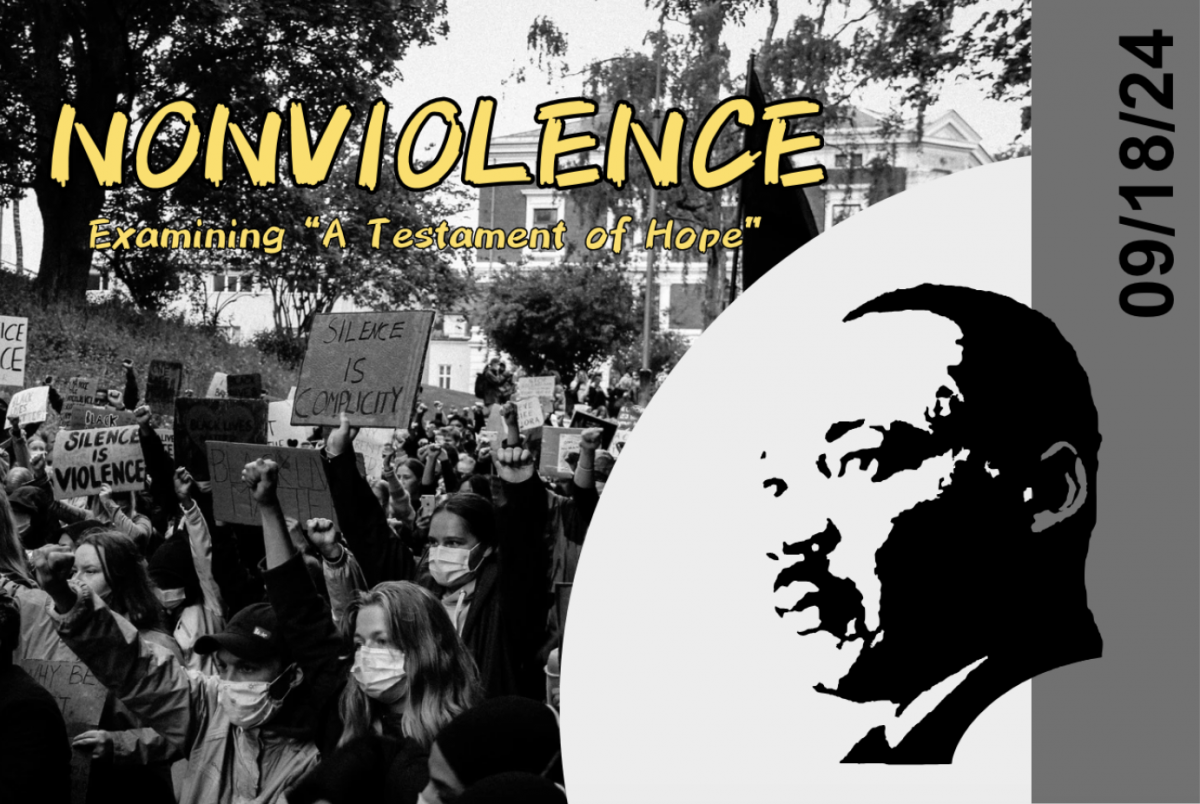英語哲学対話に参加している高校生のRicoが自身の気づきをブログで発信します。

Quick review of ideas from last week:
- Martin Luther King Jr. claims that it is important to tackle the system of beliefs or rules that appear wrong, rather than the individuals who believe in, or act according to, such ideas.
- For example, rather than dealing with racist people, we should change the racist system that exists within society, like segregation laws.
What we discussed this week:
Since this was the second to last session on Martin Luther King Jr. and his ideas on nonviolence, we examined the rest of the passages from “A Testament of Hope” today.
A:
Now, it is very interesting at this point to notice that both violence and nonviolence agree that suffering can be a very powerful social force. But there is this difference: violence says that suffering can be a powerful social force by inflicting the suffering on somebody else: so this is what we do in war, this is what we do in the whole violent thrust of the violent movement. It believes that you achieve some end by inflicting suffering on another. The nonviolent say that suffering becomes a powerful social force when you willingly accept that violence on yourself, so that self-suffering stands at the center of the nonviolent movement and the individuals involved are able to suffer in a creative manner, feeling that unearned suffering may serve to transform the social situation.
Like any other session, we began by paraphrasing the passage to understand what MLK is saying in this text: suffering is very powerful when using both violence and nonviolence. With violence, one gains power by causing suffering on other people; on the other hand, suffering becomes a force to change things with nonviolence, as one accepts it on oneself.
We were able to easily come up with an example for the first case with violence. A bully uses the suffering of others to get what they want. They can shove or punch a classmate to take away their snacks, for instance.
However, to understand the second scenario, it was important to know why accepting suffering is powerful. Mr. Dutson came up with a situation where people are protesting for peace (anti-war). What will happen if the protestors throw rocks at others in response to the rocks being thrown at them? The efforts of the protestors will be undermined because they are being hypocrites—people whose actions do not match their words. Why would they become violent if they were going against it? This circles back to MLK’s previous argument on how the means and the ends must cohere.
On the other hand, if the protestors simply continue protesting, even when rocks are thrown at them, they are accepting suffering on themselves. This makes them stronger as a group as people are brought together in what they go through. Furthermore, their persistence in remaining peaceful from the outside shows that their words and actions–or means and ends–are consistent. The protestors appear as right-minded people who can be trusted, which will then inspire other people to act in the same way. Suffering is powerful because it sets a moral example that people can follow to achieve a peaceful society without war. This serves as an example to the second case of MLK’s argument A.
B:
And so the nonviolent resister never lets this idea go, that there is something within human nature that can respond to goodness. So that a Jesus of Nazareth or a Mohandas Gandhi can appeal to human beings and appeal to that element of goodness within them, and a Hitler can appeal to the element of evil within them. But we must never forget that there is something within human nature that can respond to goodness, that man is not totally depraved; to put it in theological terms, the image of God is never totally gone.
Moving on to the second passage, we again started the discussion by unraveling the message in the text. MLK claims that there is “goodness” in human nature that we can show to people to bring goodness in society.
Now, there were multiple questions that were brought up from this passage:
- Can a person act in accordance with MLK’s principles of nonviolent resistance without being a Christian or believing in God?
- What is human nature?
- Is there such a thing as human nature?
- Are some people born “good” and some “bad”?
The first question was easy to answer, given that his conception of nonviolence does not depend on a person being Christian. While he mentions Jesus in this passage, he does not refer to any religion or God in the previous texts. Besides, MLK takes inspiration for his principles of nonviolent resistance from Gandhi, who was not Christian.
The three remaining questions were more difficult and took more time to process. We defined human nature as something we are born with and we all agreed that human nature exists in some way or another. However, when it came to the question of what were the elements of human nature, we had multiple opinions.
I thought that humans are born with a set of goodness and badness, like yin and yang, that based on the environment the person grows up in, the good or the bad can occupy more space within. In other words, the good and the bad coexist within a person, but the person can grow to stand out in a specific area of good or bad, like empathy and greed respectively.
Another student thought that people are born with traits or temperament that are not necessarily “good” or “bad”, but can be labeled as such as they grow up. In this sense, people can do bad things without being bad people necessarily—they could just be ignorant, for example.
Finally, another idea was that the “good” or the “bad” are not inherent but learned individually through experiences and observations. Children learn by copying the people around them, and they would think they have done the correct thing if people around them looked happy. For example, Hitler could have grown up to believe that killing Jews would make Europe better because this attitude could have been unintentionally encouraged by someone around him.
I felt like this was one of our most active sessions with a diverse set of thinking from the same passage. It was very interesting to listen to what others’ opinions were, and although they were different, I was able to find some similarities which deepened my understanding of human nature. I wonder what we are going to talk about for our last MLK session next week!




